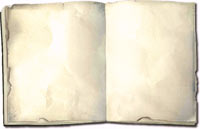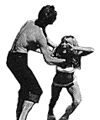Black Ink on an Infinite Canvas...
Tuesday, March 20, 2007 → by Danieru You heard about a book. Intrigue darkened in its normal consistency and gripped you. Something about the book’s ability to project the reader into the world of another mind. A world with characters leading implausible lives between a chapter, a page, a paragraph; sometimes merely within the rhythmic pentameter of one sentence. The writer is unknown to you, yet through the patterns of perspective weaved into you can clearly be made out a new colour, never before realised. Perhaps the book will be a let down, many are. Some wished-for vistas dull to grey, their sky-piercing peaks devolving, eroding to a single extended dimension over time. Perhaps, after some musing, you’ll be less alive in the book’s pages than in your own mind, and which reader seeks for that existence? The one they think they already know; the one they comfort awake each morning and rotate within their minds, is less whole than the world of the book. You ponder this, pausing for a moment to let the idea sink in. Is every book more real than an existence? Surely you’ll only discover by reading more. That’s what books are for.
You heard about a book. Intrigue darkened in its normal consistency and gripped you. Something about the book’s ability to project the reader into the world of another mind. A world with characters leading implausible lives between a chapter, a page, a paragraph; sometimes merely within the rhythmic pentameter of one sentence. The writer is unknown to you, yet through the patterns of perspective weaved into you can clearly be made out a new colour, never before realised. Perhaps the book will be a let down, many are. Some wished-for vistas dull to grey, their sky-piercing peaks devolving, eroding to a single extended dimension over time. Perhaps, after some musing, you’ll be less alive in the book’s pages than in your own mind, and which reader seeks for that existence? The one they think they already know; the one they comfort awake each morning and rotate within their minds, is less whole than the world of the book. You ponder this, pausing for a moment to let the idea sink in. Is every book more real than an existence? Surely you’ll only discover by reading more. That’s what books are for. The book rests in your hands now. You probably purchased it from a high street store, traipsing to its counter, clutching hours of your future experience in a sweaty palm. Several pound coins exchanged for a ticket of sustenance; a feeder of mental schema; a self deliberation machine. Some say this book is capable of bridging the present to the future - as if there were any difference between them. You overhear two teenagers bantering amongst themselves on the bus. Their knowledge of the book soothes you, leaves you grasping at coincidental narratives in your life; playing with conspiracy theories reverberating inside you. ("Things tend to happen in bundles.") And they crease up double in excitement, one claiming that a time portal projected the book from a thousand years in the future. Its magical elements, its speculative qualities arising not from shear force of the writer’s imagination, but by retrospective temporal chance. That any book written in the future, sent backwards in time, will instantly become science-fiction.
The book rests in your hands now. You probably purchased it from a high street store, traipsing to its counter, clutching hours of your future experience in a sweaty palm. Several pound coins exchanged for a ticket of sustenance; a feeder of mental schema; a self deliberation machine. Some say this book is capable of bridging the present to the future - as if there were any difference between them. You overhear two teenagers bantering amongst themselves on the bus. Their knowledge of the book soothes you, leaves you grasping at coincidental narratives in your life; playing with conspiracy theories reverberating inside you. ("Things tend to happen in bundles.") And they crease up double in excitement, one claiming that a time portal projected the book from a thousand years in the future. Its magical elements, its speculative qualities arising not from shear force of the writer’s imagination, but by retrospective temporal chance. That any book written in the future, sent backwards in time, will instantly become science-fiction. Your laughter surprises you. The old man aside you, smelling of a musk brewed deep into the age of his skin; the quaintness of his clothes, gives you a sidelong glance. Perhaps he has been listening too, and understands nothing. You have the book, but does he? You glance around at the bus passengers. Woolen hatted, hip-hop hooded, hairspray styled, permed and protected. Which head has this book made its way into already? What’s the head got that the book hasn’t? Is the book or the perception of the book the true virus? What is the book? What is mind? How can one bridge the two? You suddenly feel queasy as the bus jerks along the busy road and notice, in turning, a colour which reminds. Across and left of you another passenger clutches a copy of the book in their hands; pages half open. Peering lovingly at collections of symbols, arranged into semblamatic order and printed into the grain of the page. Black ink on an infinite canvas, building a world with each sweep of the reader’s eye.
Your laughter surprises you. The old man aside you, smelling of a musk brewed deep into the age of his skin; the quaintness of his clothes, gives you a sidelong glance. Perhaps he has been listening too, and understands nothing. You have the book, but does he? You glance around at the bus passengers. Woolen hatted, hip-hop hooded, hairspray styled, permed and protected. Which head has this book made its way into already? What’s the head got that the book hasn’t? Is the book or the perception of the book the true virus? What is the book? What is mind? How can one bridge the two? You suddenly feel queasy as the bus jerks along the busy road and notice, in turning, a colour which reminds. Across and left of you another passenger clutches a copy of the book in their hands; pages half open. Peering lovingly at collections of symbols, arranged into semblamatic order and printed into the grain of the page. Black ink on an infinite canvas, building a world with each sweep of the reader’s eye. Then there is the reading. The final hour when you lurch through time towards the moment, merely a moment, when the book falls open. Skip the contents page, rush through the dedication, straight into the first chapter. You wonder whether you’ll end up bordering another world. Perhaps the writer stares back at you; each ink blot tunnelling a black-hole towards them; every mind which reads it swirls off the page, twixt another universe to meet together; minds merging eternally. A writer, a tribe of readers, an infinity of worlds combine as one. The protagonist is drawn, looking out, up and over your shoulder back around and into the book you now hold. An infinite ouroboros swallowing its eternal tale. The first word comes up to meet you. It envelopes your entire being: who owns this moment?
Then there is the reading. The final hour when you lurch through time towards the moment, merely a moment, when the book falls open. Skip the contents page, rush through the dedication, straight into the first chapter. You wonder whether you’ll end up bordering another world. Perhaps the writer stares back at you; each ink blot tunnelling a black-hole towards them; every mind which reads it swirls off the page, twixt another universe to meet together; minds merging eternally. A writer, a tribe of readers, an infinity of worlds combine as one. The protagonist is drawn, looking out, up and over your shoulder back around and into the book you now hold. An infinite ouroboros swallowing its eternal tale. The first word comes up to meet you. It envelopes your entire being: who owns this moment?"Beg of me a tale," the book calls, "to set our kind alight; draw veils of day over sweeping dreams of night."
Categories: Fiction, Literature, Sci-Fi, Weird, Writing, Perception, Reality, Philosophy, Simulacrum, Consciousness, Time
|
|

 Links
Links Subscribe via RSS!
Subscribe via RSS!


 Via Email
Via Email


Post a Comment